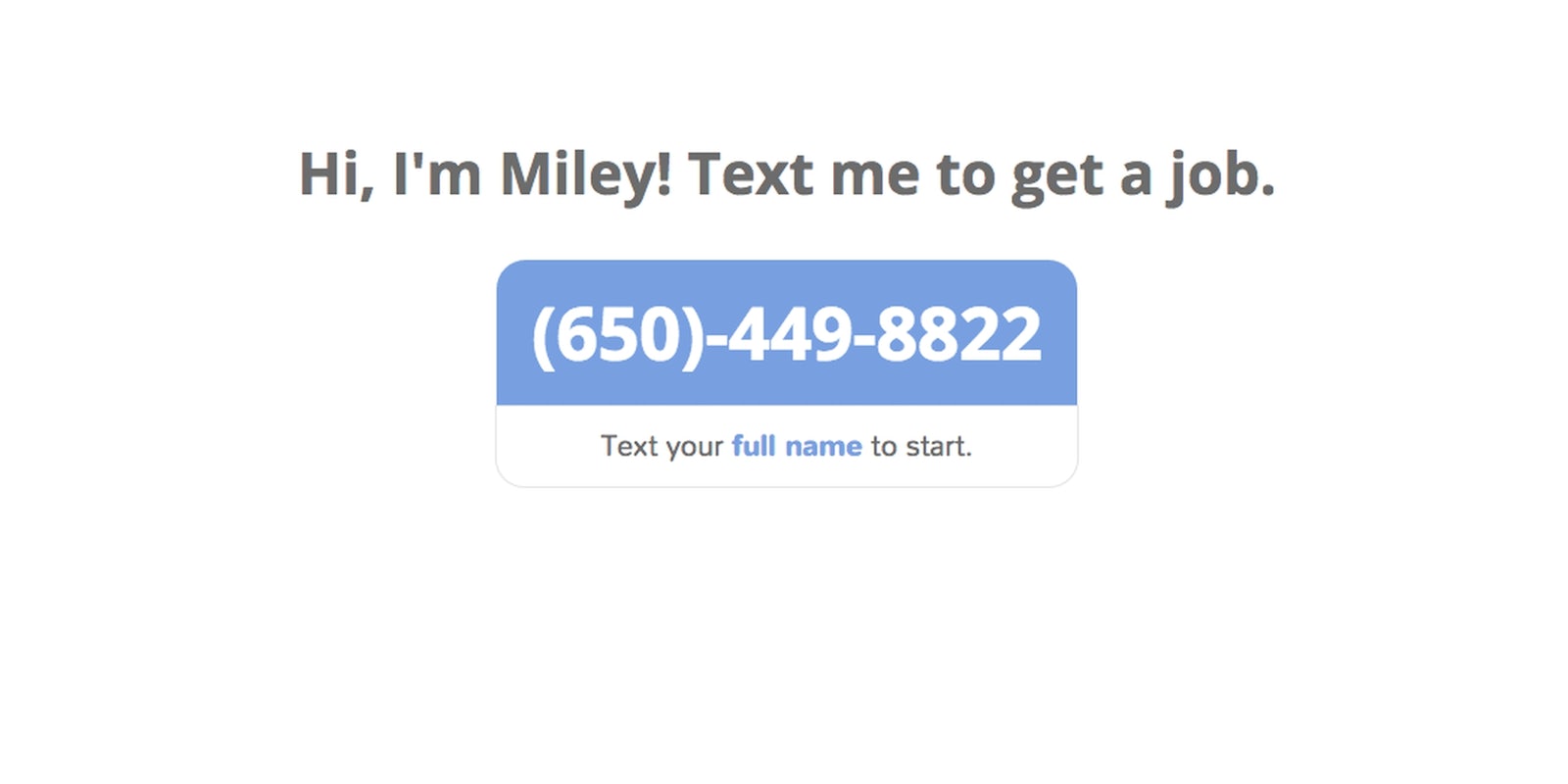Silicon Valley now has a temp agency. Meet Miley, the text-based job recruiter that wants to hook you up with a “sweet” new gig.
Here’s what Miley promises: spend five minutes texting with a sociable bot and it’ll fast track you for a position with “the hottest companies throughout the country.” Within about three days, you’ll have an interview lined up for a job that pays $15-20 an hour.
Sound too good to be true? Yeah, it is.
Miley, which is only available in New York and San Francisco for the time being, isn’t a job creator or some sort of secret shortlist for job you want; it’s an automated advertisement for the tech industry’s most expendable gigs.
Independent contractors make the sharing economy go round. They are also what keep the overhead costs down for companies: spend next to nothing up front in training, pay only for work completed rather than hourly or guaranteed wages, snag a nice chunk of that income before dropping it in the worker’s pockets—all while keeping the costs of doing business on the side of the contractor—and you have the formula for maximum profits and minimal costs.
What Miley is really designed to do is turn people looking for work into independent contractors. Its partnerships are primarily with companies that utilize those types of employees and are happy to take on more. After all, the companies don’t have to manage hours. If their contractors are without clients, they don’t have to pay even if those contractors are out toiling away in search of work to do.
One thing that can’t be disputed: Miley does indeed have the hookups with big names in the business. That’s thanks to OnboardIQ, the machine running behind the friendly face of Miley. OnboardIQ’s aim is to automate the hiring process by taking care of scheduling, background checks, document signing, and other paper-pusher tasks. Basically, it takes over few positions that would have required a human presence within the hiring process.
The list of partnered brands on Miley’s homepage include Caviar, a third-party delivery service that brings food from restaurants to your doorstep, and Zirx, an on-demand parking app that turns strangers into valets. Among the primary investors in OnboardIQ’s recent $1.7 million round of funding: Zirx founder and CEO Sean Behr and Caviar founders Shawn Tsao, Andy Zhang, Richard Din, and Jason Wang. It’s not too hard to draw the line to connect those two dots.
OnboardIQ also received cash from the Head of Operations at Shyp, CEO of Postmates, and CTO of Zesty, independent contractor reliant services all. It netted money from angel investment firm Slow Ventures, which has also invested in Wag (on-demand dog walking), Amberjack (on-demand guided fishing trips), Luxe (Zirx competitor in the on-demand valet parking service)…you get the idea, yes? OnboardIQ’s list of investors reads as a pu pu platter of “Uber for X”s.
Working at any of these startups would probably be pretty sweet—they’re flush with cash and potential and are currently leading the charge in reshaping the economy. But when you’re filing a 1099 instead of a W-2, you aren’t working at Hot Startup X, you’re working for them—and for less than you’d expect.
A survey of 1,330 of Silicon Valley companies’ contract workers conducted by Request for Startups found nearly 43 percent of workers leaving a 1099 job cited insufficient pay. Over a quarter of workers in delivery or ridesharing gigs are without health insurance. Nearly one-in-ten ridesharers don’t have car insurance; over 15 percent of delivery drivers go without it. The companies hiring contractors offer no help in this regard.
That’s important to keep in mind when looking at the wages for these farmed out gigs. Miley promises $15-20 an hour, and findings from Request for Startups support that claim: the average hourly wage for contract workers is $18.
That’s before costs accrued are accounted for. Because when you’re a contractor, there are no health benefits, no expense reimbursement, no paid leave, and no guaranteed hours. Request for Startups found the average ridesharing contractor forked out $965 in expenses every month for gas, insurance, maintenance, and parking. Even if you’re logging 40 hours of work a week—unlikely, given that an internal study conducted by Uber found over 80 precent of its drivers work under 34 hours a week—you’ll be sinking about one-third of your income into upkeep.
This is the type of work Miley can find; the kind that, if you want to survive, requires you to work what would be overtime at any other job. Request for Startups found the biggest concern among contractors is finding enough work; about half of all those surveyed cited it as a pain point. But hey, no worries, workers: Miley can find another position with no guarantees for you.
Of course, if you’d rather go the more traditional route, Miley can help you, too. It’s partnered with Target and Starbucks, both of which would be happy to provide you with an entry-level job. According to Glassdoor, the average Target sales associate makes about $9 an hour, while Starbucks baristas pull down about $9.50. There’s no shame in this type of work, but both fall well below that vaunted $15-20 figure Miley promises and neither are particularly elusive opportunities for anyone who wants to apply.
For twentysomethings still getting by on their parents’ health insurance and looking to net some extra income on the side while finishing school or entering the workforce, spending time as a contractor might make sense. But for the 8.7 million unemployed people in the United States, a contract gig isn’t going to cut it. They don’t need Miley. They need jobs.
Screengrab via TextMiley.com


